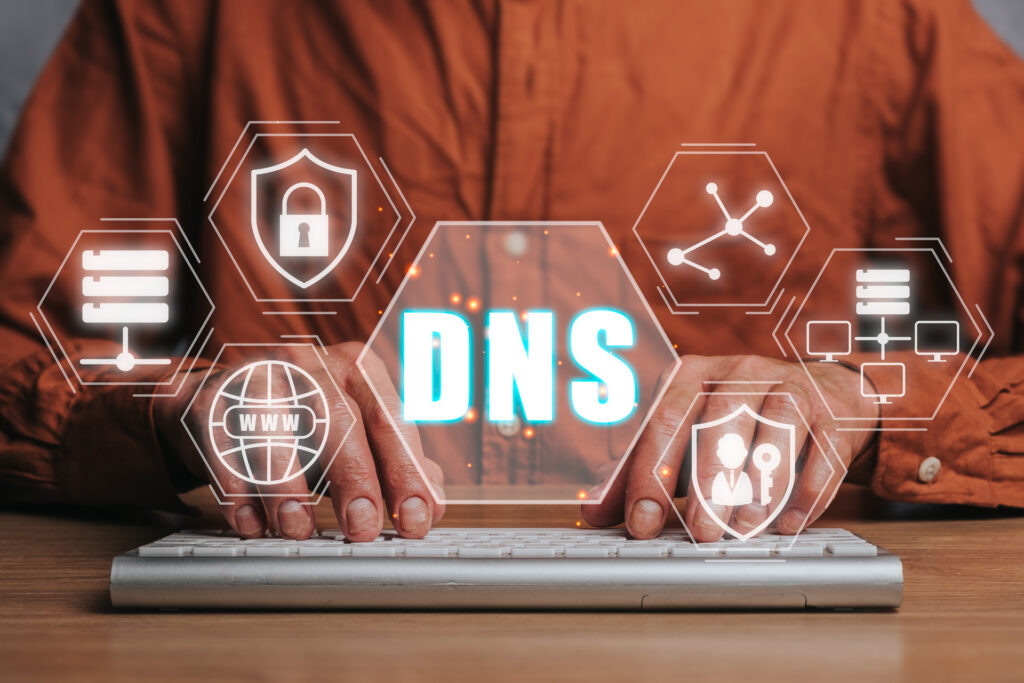Table of contents:
Cybersecurity is a major issue, and every business knows this. However, most experts find it difficult to navigate the complex scenarios involved, particularly when it comes to data privacy. DNS security is a significant headache for businesses. Clients constantly engage with brands through websites, exposing them to various security risks.
That’s why, as a business owner, you need to up your game. This article will show you the types of DNS attacks that affect you and your customers. We will also examine the most vulnerable cybersecurity areas of your business. Finally, the report will provide practical solutions to enhance your strategy.
What is DNS Security?
DNS, or “Domain Name System,” is the internet hub from which users access internet experiences. Think of it as a traffic policeman at a juncture that leads to the expressway. At this point, drivers wait for the traffic policeman to direct them. And as an expert, the officer provides safe instructions so cars don’t collide with each other, or worse, drive off-road.
DNS does the same thing, except with internet traffic. By translating IP addresses, users can access different web pages on the internet. However, various security measures must safeguard this traffic to ensure its safety. That’s what DNS security comprises.
Without it, cyberattacks would have free reign on the internet. Its integration keeps internet environments secure, so users and websites can operate without worry. Like the traffic policeman in the scenario, it offers complete protection, fending off issues and guiding IP requests to their desired locations.
Despite the sophistication of these protective barriers, numerous attacks still target DNS structures. These attacks infiltrate and steal user information, rendering website platforms unsafe for use.
DNS Attacks
Various online attacks constantly expose DNS-layer security, depending on the operational protocols. Some of the most malicious online attacks include the following:
- Tunnel Attacks: Sometimes, malicious codes infiltrate DNS processes. Such codes then bypass security measures, affecting website data.
- Spoofing: Some attacks clone DNS responses and redirect them to malicious websites. The attacker then uses these new locations to upload malicious instructions.
- DDoS Amplification Attacks: These types bombard DNS servers with massive amounts of cloned DNS queries. As a result, DNS servers are unable to handle the floods of requests, disrupting system access.
- DNS Hijacks: These types act like spoofs, except instead of cloning the responses, they change DNS settings.
Only by implementing a solid DNS security strategy can your business beat these attacks.
Effects of Poor DNS Security
These risks affect DNS-layer security, causing numerous problems for websites. The more problems they cause, the less efficiently these systems can operate. The following is a list of the issues that the affected businesses are facing:
Data Privacy Breach
Users access your website with the implicit understanding that they can entrust their information and data without fear. As a business, your open doors automatically guarantee their free exploration without losing crucial information.
But without solid DNS security solutions, attacks expose your customer and business data to malicious parties. Cyber attackers can steal sensitive info from your website’s directory and use it against your clients. This puts your business through numerous legal and financial battles, costing it money and time.
Poor Business Operation
Attacks on DNS security services can shut down business servers, especially with overflowing cloned queries. Combine that with constant data breaches, and your business spends much time finding solutions. This cuts into operational time, costing you time and money.
As your business suffers this operational lag, its online performance and response slow down. This automatically translates to longer customer query queues, which isn’t beneficial for reviews. The more dissatisfied clients you have, the more business you lose.
Damaged Reputation
Poor DNS-layer security exposes a business’s websites to numerous issues. These constant attacks render your brand untrustworthy and unreliable. Clients and investors see the risk-prone nature of your platform and pull out en masse. And if this keeps up, your business may eventually close up shop.
How to Implement an Effect DNS Security Strategy
As a business owner, you don’t want your websites exposed to constant DNS attacks. Besides the obvious breach in client information, you’ll lose money, time, and face. So, how do you protect your business with a robust DNS security strategy? Here are tips below:
Consider Network Segmentation
Third parties oversee the majority of DNS security services, giving them a tremendous deal of flexibility. However, it also means that your business shares these networks with others. Therefore, an attack on others will render your business vulnerable.
That’s why you should consider segmenting your DNS network. Your vendor can provide this feature, so only a limited number of users can share your server. This way, they can easily manage potential attacks and protect your business from exposure.
Use Multiple-Layer DDoS Protection
Your DNS security solutions should employ numerous tactics. So, ask your DNS server vendor to provide the following features:
- Layers of configurable protocols
- Traffic tracking tools
- Monitoring tools
- Traffic isolation tools
- Traffic identification and deferment tools
- Malicious spike-triggering tools
If your vendor offers these multi-layered procedures, protecting your network from attacks becomes much easier.
Prioritize DNSSEC Mandation
Cache attacks are successful because they exploit DNS servers that don’t run automatic verification of responses. So, stop this by including DNSSEC.
It allows your network to fend off cache attacks faster and better. DNSSEC matches responses using public keys and cryptographic verification. This ensures that your DNS system’s dependence on cache data remains uncompromised. Introducing DNSSEC prevents spoof attacks, cache attacks, and other types of attacks from redirecting your users to nefarious pages.
Choose Closed-Source DNS Resolvers
Open-source DNS security services are often cheaper and simpler to set up. However, these advantages also present challenges, as attacks can more easily exploit them.
But when your business uses a closed-source DNS system, it stays fully protected from attacks. These types of systems offer stronger guarantees for their financial value by testing various loopholes for cyber infiltration. Plus, they run constant updates to keep their firmware optimized.
Purchase Private DNS Networks
A major reason why most businesses use public DNS servers is their affordability. With them, you spend less and get almost all the benefits of DNS operations. However, you also expose your business to additional risks due to the vulnerability of public networks.
So, invest in a cloud-based service instead. These types provide more layers of sophisticated protection against DNS attacks. With a private network, you and your customers can enjoy complete privacy and autonomy in your online space.
How We Can Help
DNS security is essential to your business’s digital infrastructure. DNS attacks can cause data breaches and reputational damage. At North South Tech, we’ve created a portfolio of powerful DNS security solutions for your needs.
We evaluate your DNS setup, detect problems, and suggest practical, effective solutions. We’ll help you with network segmentation, multi-layer DDoS protection, and private DNS networks.
To combat new dangers, our staff updates its knowledge base frequently. We empower our clients, so we’ll work with you to explain our metrics and why they’re vital.
Don’t wait for DNS attacks to reveal vulnerabilities. Message us today to discuss DNS security enhancements. We guarantee your data, reputation, and peace of mind!





